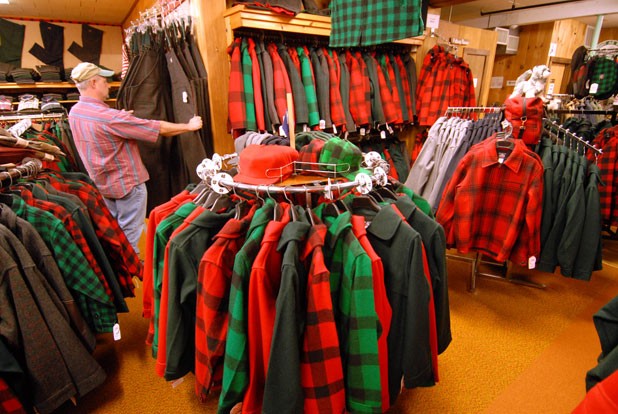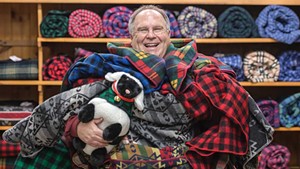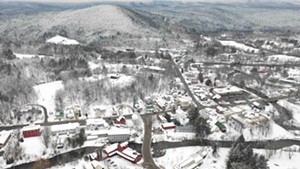
- Jeb Wallace-Brodeur
- Johnson Woolen Mills
Imagine a Japanese hipster wearing a traditional outdoorsman’s wool vest with unusual touches — say, pockets and belt loops in retro plaids that contrast with the rest of the garment. If you see such a thing on the streets of Tokyo, and it’s thick, warming wool rather than a flimsy knockoff, there’s a good chance a Vermonter sewed it at the Johnson Woolen Mills.
At a time when most U.S. manufacturers are outsourcing labor to Asia, the 166-year-old business on the edge of the Northeast Kingdom is bucking the trend. Its 25 seamstresses turn out sturdy garments made of U.S.-spun fabric that generate about $2 million in annual sales. And owner Stacy Manosh says between 40 and 50 percent of those sales are to Japanese distributors and retailers: “The Japanese market has really saved us. Without them, I don’t know where we would be, because they love old and they love American.”
Tokyo chic probably isn’t what visitors to the Woolen Mills are thinking when they step into its factory store on Route 15. Inside are the types of woolen goods urbanites think of as quintessentially Vermont: black-and-red-checkered jackets, dark-green bibbed overalls, mittens to fit everyone from toddlers to Big and Talls, plaid throw blankets, neon-orange hunting gear. Here, tradition reigns. The olive-green whipcord pants look just like the ones her grandfather used to wear, says Store Manager Rachal Longley. (Back in the day, she adds, Johnson Woolen Mills made similar pants for the U.S. Army.)
But there’s also a women’s line with some whimsical touches — you can get that huntsman’s checked wool fabric in a tiny handbag with pockets for water bottles. The women’s flannel-lined anoraks are a “gold mine,” says Longley: Even with a $220 price tag, “they were selling like hotcakes” at a recent expo. Besides products made on-site, the store sells a variety of other lines, from Woolrich sweaters and SmartWool socks to the dainty patterned handbags of Vera Bradley.
“Women — that’s where the growth is,” says Manosh. “Men, they don’t like change.”
But over its century and a half, the Woolen Mills has seen its share of changes. When the company incorporated in 1842, there were six sheep for every Vermonter, and local farmers brought their wool to the factory to be spun and dyed. In 1905, D.A. Barrows, Manosh’s great-grandfather, bought into the business. Around the early 1950s, Manosh says, her family stopped processing the raw wool and started buying fabric from other mills, generally in New England.
Manosh purchased the company from her father in 1998. In a 2004 profile in Vermont Business Magazine, the fourth-generation owner explained why her dad made her come up with the cash: He “didn’t think women belonged running businesses.”
For her part, Manosh was sure she belonged in the family business, where she’d done odd jobs as a child and worked for nine years after college as a sales rep: “Everyone has a dream, and this was my dream,” she says. Slim, blond and youthful-looking at 46, Manosh likes to ski Jay Peak and ride a Harley Davidson Fat Boy in her spare time. She peppers her speech with phrases such as “awesome” and “off the charts” and the occasional folksy Sarah Palinism (“Who’d a’ thunk it?”). She rolls her eyes over examples of outsourcing like Chinese-made Boy Scout jackets (“You wonder why we got a problem? Hello!”) and vigorously criticizes Vermont’s regulations as “business unfriendly.”
Given her energy, it’s hard to believe Manosh just returned from 17 “grueling” days at the Eastern States Expo, or “Big E,” a mega-fair in West Springfield, Massachusetts, where the Woolen Mills has a booth in the Vermont Building. “It gives us incredible exposure to an urban market with a higher disposable income,” she says. “We hand out literally thousands of store brochures. We whet their appetite with our products down there, and we tell them how beautiful Vermont is.”
Although the Woolen Mills sells some items through its print catalogue and website, and others through dealers such as L.L. Bean, customers who want to see the full inventory have to come to the factory store. And word of mouth is vital to a business that doesn’t “have a huge advertising budget,” Manosh acknowledges. In the factory’s entrance hall, she points proudly to a photo of John Ratzenberger (a.k.a. Cliff Clavin on “Cheers”), who came to the Woolen Mills a few years ago to shoot a segment of his Travel Channel show, “Made in America.” “By the end of the day, he knew all the employees by their first names,” she says. And every time the network reran the episode, “the phone would start ringing; the emails would start coming in, saying, ‘Send us a catalogue.’”
On the wall, not far from the snapshot of Ratzenberger and others from various trade shows, hang photos of Manosh’s great-grandfather, grandfather and father — plus Calvin Coolidge and Teddy Roosevelt. On the other side of the foyer, a rack holds product samples for visiting dealers to peruse, from a child’s vest with teddy-bear-shaped pewter buttons to a woman’s car coat.
It’s just a few steps to the cutting area, “where it all starts,” Manosh says. Here two men are rolling out an expanse of dark-green fabric on a raised platform almost as long as a bowling alley. From this they use patterns to cut pieces that go to the big open room next door, where a few women are busy at sewing machines; an inspector works at the counter on the far wall.
“The girls here, they’re like artists,” Manosh says. “They’re just off-the-charts awesome when it comes to creativity.” She’s especially appreciative of their skills, she adds, because “I, for one, can’t hardly sew a button on.”
Downstairs in shipping and receiving, shelves hold cartons of overstock and products waiting to be sent to destinations such as Paris, France, and Kobe, Japan. Manosh points out a vest made for an Arkansas store called A.G. Russell’s for Men — with buttons. (“Out West, they like buttons; we like zippers,” she explains.) Rows of heavy-duty green-wool pants wait for an order: “If L.L. Bean calls up and asks for 600 pairs of pants, you better have them.”
The pants are a “bread-and-butter product,” Manosh says; the factory has been turning them out with few changes for “well over 150 years.” But the constancy of those classic styles — and their durability — can be a double-edged sword. “People will come to us with their coat in tatters — it’ll be 30, 40 years old — and they’ll say, ‘Oh, can you do a new collar, a new cuff?’” Manosh says. “And you kinda look at them and say, ‘Maybe you could buy a new one and help us out.’ But it might have been from their grandfather or their father. Their lucky hunting jacket.”
Garments that last for decades don’t come cheap, at least by the standards of big-box stores. The pants run from $180 to $200; a pair of patchwork mittens is $40, and a women’s voluminous, pewter-clasped cape goes for $260. The problem is drumming up repeat business, and that’s where new markets with more interest in trends and variety come in.
Women are one such market. They’re “the ones with the credit cards,” Manosh points out. The Japanese are another. Japanese dealers are “thrilled to death that we will make for them what they want” — not just smaller sizes, but also designs that might not fly with the more staid New England clientele. “They like very unique colors, patterns,” Manosh says, pointing to a pair of mittens with contrasting color patches on the palm. Magenta plaids? “We wouldn’t have thought of it, but they’re beautiful,” she notes. The Japanese “like patchwork and they like funky stuff. My great-grandfather would be turning like a rotisserie in his grave, going, ‘Oh, my God, what is she doing?’”
Flexibility may not be an echt Vermont virtue, but Manosh sees it as essential. “It’s not like the old auto dealers that just used to keep cranking out big old Cadillacs after Cadillacs and not realizing what the people wanted was a smaller car with better gas mileage,” she says. “The only way we’ve been able to survive is to listen.”
Because the Japanese clients are proprietary about their designs, not much of the funky stuff makes it to the Johnson sales floor. There, in a building connected to the factory by an elevated walkway, customers who look to be in their retirement years browse through woolen and cotton goods. “Made right here — how often do you see that?” a man asks his female companions.
Manosh says one prospect she’s keeping “on our radar” is to open an outlet store in Chittenden County: “There are so many sales to be had that we are missing in that area.” (Currently, only Lenny’s Shoe and Apparel in Williston carries Woolen Mills products.)
But Manosh knows that “You can only expand as far as your production. We are trying to grow in a way that we can support our sales,” she says. “We’re a little slower than the average Joe. Really, there’s no boom or bust with us. We just creep along; we can keep people working.”
There’s something to be said for slow growth in the current economic climate. Manosh says she’s struggling with increases in the price of raw materials: “The surcharges alone on metal have been huge this year. Our wool fabric went up almost 29 percent.”
All the same, she thinks Johnson Woolen Mills “will always have a niche.” For one thing, she can point out to cash-strapped customers that a toasty wool shirt is a great energy saver. And, in a less tangible sense, Americans may find themselves drawn back to basics — seduced by goods that are visibly “old and American,” just like the Japanese customers who snap up those same classics with a snazzy twist.
“I think people, in times of stress and turmoil, they can put on their old jacket,” Manosh says. “It feels fuzzy and warm, and it’s like comfort food on a cold day.”












Comments
Comments are closed.
From 2014-2020, Seven Days allowed readers to comment on all stories posted on our website. While we've appreciated the suggestions and insights, right now Seven Days is prioritizing our core mission — producing high-quality, responsible local journalism — over moderating online debates between readers.
To criticize, correct or praise our reporting, please send us a letter to the editor or send us a tip. We’ll check it out and report the results.
Online comments may return when we have better tech tools for managing them. Thanks for reading.